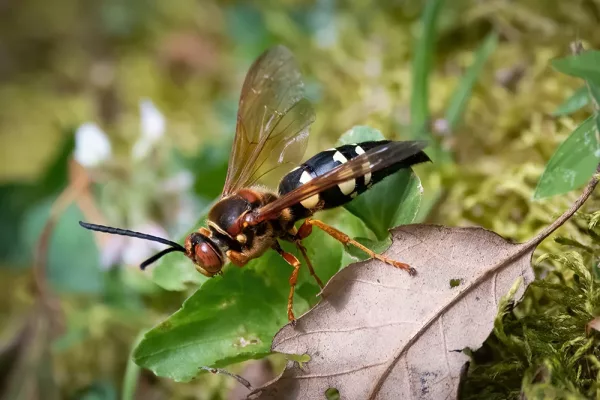Cicada Killers
What are Cicada Killers?
Cicada killers are a type of solitary wasp that are known for their large size and distinct appearance. These wasps are commonly found in North America, and are named for their habit of hunting and preying on cicadas. While cicada killers can be intimidating due to their size and hunting behavior, they are not typically aggressive towards humans and generally pose little threat. However, if you have a cicada killer infestation on your property, it’s important to address the issue in order to prevent potential damage and minimize the risk of stings.
On this page, we’ll provide you with all the information you need to know about cicada killers, including their life cycle, appearance, habits, and potential risks. We’ll also discuss prevention and control measures, and provide advice on when to seek professional help from a pest control expert. So whether you’re curious about these fascinating insects or dealing with an infestation, read on to learn everything you need to know about cicada killers.
What do Cicada Killers Look Like?
Cicada killers are a type of large wasp that can grow up to two inches in length. They have a distinct yellow and black striped pattern on their abdomen, and their thorax and head are a rusty-red color. The wings of the cicada killer are a translucent brown and can span up to three inches.
One distinguishing feature of the cicada killer is their large, curved mandibles that they use to capture and carry cicadas. The females have larger mandibles than males, and they use them to dig burrows in the ground where they lay their eggs.
Overall, the cicada killer has a fearsome appearance, but they are not typically aggressive towards humans unless provoked.

What is the Life Cycle of Cicada Killers?
Cicada killers have a unique life cycle that spans one year. The female cicada killer burrows into the ground to create a nest chamber where she lays her eggs. She typically lays between one and three eggs per chamber. The eggs hatch into larvae, which feed on cicadas that the female has captured and stored in the nest.
Once the larvae have grown, they pupate and transform into adults. The adult cicada killers emerge from the ground in the late summer or early fall. After mating, the male cicada killers die, while the females begin to hunt for cicadas to provision their nest chambers.
Cicada killers are known for their distinctive buzzing sound, which is made by the males as they fly over their territory, searching for mates. While the buzzing sound can be intimidating, cicada killers are actually relatively docile and will only sting if they feel threatened.
During the fall, the female cicada killers dig new nest chambers and lay their eggs. Once the eggs hatch and the larvae have matured, they overwinter in the nest chambers. The following spring, the new adult cicada killers emerge from the ground, marking the start of a new breeding cycle.
Knowing the life cycle of cicada killers can be helpful in identifying and controlling infestations. If you notice an increase in activity in late summer or early fall, it could be a sign that there are cicada killer nests nearby. By understanding the life cycle, you can take appropriate measures to control the infestation and prevent future ones.
It’s important to note that while cicada killers can be a nuisance, they are actually beneficial to the environment. They help to control cicada populations, which can cause damage to trees and shrubs. Additionally, cicada killers do not typically cause damage to structures or pose a threat to humans or pets.
Do Cicada Killers Cause Damage?
Cicada killers are generally not considered dangerous to humans, as they are not aggressive and only sting when provoked or handled. However, they can cause damage to lawns and gardens, as their burrows can disrupt plant roots and cause unsightly mounds of soil.
While cicada killers are not known to be harmful to pets, their large size and flying habits can be intimidating to some animals. It is best to keep pets away from active cicada killer nests to prevent accidental stings.
It is important to note that cicada killers are not known to cause structural damage to homes or buildings. They do not bore into wood or cause the type of destruction that other pest species, such as termites or carpenter ants, can cause.
Overall, while cicada killers may be a nuisance to homeowners and gardeners, they are not a significant threat to the safety or structure of your property. If you are concerned about cicada killers on your property, it is best to consult with a pest control professional to discuss control options.
Are Cicada Killers Beneficial?
Yes, cicada killers can be considered beneficial as they help regulate the population of cicadas, which can be considered pests due to the damage they cause to trees and shrubs. Cicada killers are also not aggressive towards humans and generally do not pose a significant threat, so they can be left alone to perform their natural function without causing harm.
Additionally, cicada killers play a role in the ecosystem as prey for birds and other predators. They can also help aerate the soil in which they build their burrows, which can lead to better plant growth in the area.
However, if cicada killers are causing damage to lawns and gardens or becoming a nuisance in a particular area, it may be necessary to take action to control their population. In such cases, it is recommended to contact a professional pest control service to ensure safe and effective removal.
How Can I Prevent Cicada Killers?
One of the best ways to avoid a cicada killer infestation is to take preventative measures. By making your outdoor space less appealing to these insects, you can significantly reduce the likelihood of an infestation. Here are some preventative measures to consider:
-
Reduce Attractants: Cicada killers are attracted to areas with an abundant food supply, such as trees and flowering plants. To reduce their attraction to your yard, consider removing or reducing the number of trees, bushes, and flowering plants.
-
Keep Lawn Mowed: Cicada killers prefer nesting in areas with tall grass, so keeping your lawn well-mowed can discourage them from choosing your property as their nesting site.
-
Reduce Moisture: Cicada killers prefer moist soil, so make sure your yard has good drainage and avoid over-watering your lawn or garden.
-
Fill Holes: Cicada killers will often nest in pre-existing holes, so make sure to fill any holes or gaps in your yard or around your home to prevent them from using them as a nesting site.
-
Hire a Professional Pest Control Service: A professional pest control service can apply preventative treatments to your outdoor space to deter cicada killers and other pests from nesting on your property.
By taking these preventative measures, you can significantly reduce the likelihood of a cicada killer infestation and enjoy your outdoor space without the threat of these stinging insects.
Cicada Killer Treatment
Cicada killers can be alarming, but they are not typically aggressive towards humans and can be beneficial to the environment. However, if you have a large number of cicada killers on your property or they are causing damage to your lawn or garden, you may want to consider treatment options.
The best time to treat for cicada killers is early in the season when they first emerge. There are a variety of treatments available, including insecticides and organic options.
Insecticides can be applied directly to cicada killer nests or to areas where the insects are frequently seen. It is important to follow the instructions on the label carefully and take precautions to protect yourself, other animals, and the environment.
Where We Provide Cicada Killer Control
Alexandria
Aldie
Annandale
Arlington
Ashburn
Burke
Bristow
Centreville
Chantilly
Clifton
Dale City
Dumfries
Fairfax
Fairfax Station
Falls Church
Gainesville
Great Falls
Haymarket
Herndon
Lake Ridge
Lorton
Manassas
McLean
Merrifield
Montclair
Nokesville
Oakton
Occoquan
Reston
Springfield
South Riding
Sterling
Triangle
Tysons Corner
Vienna
Woodbridge

